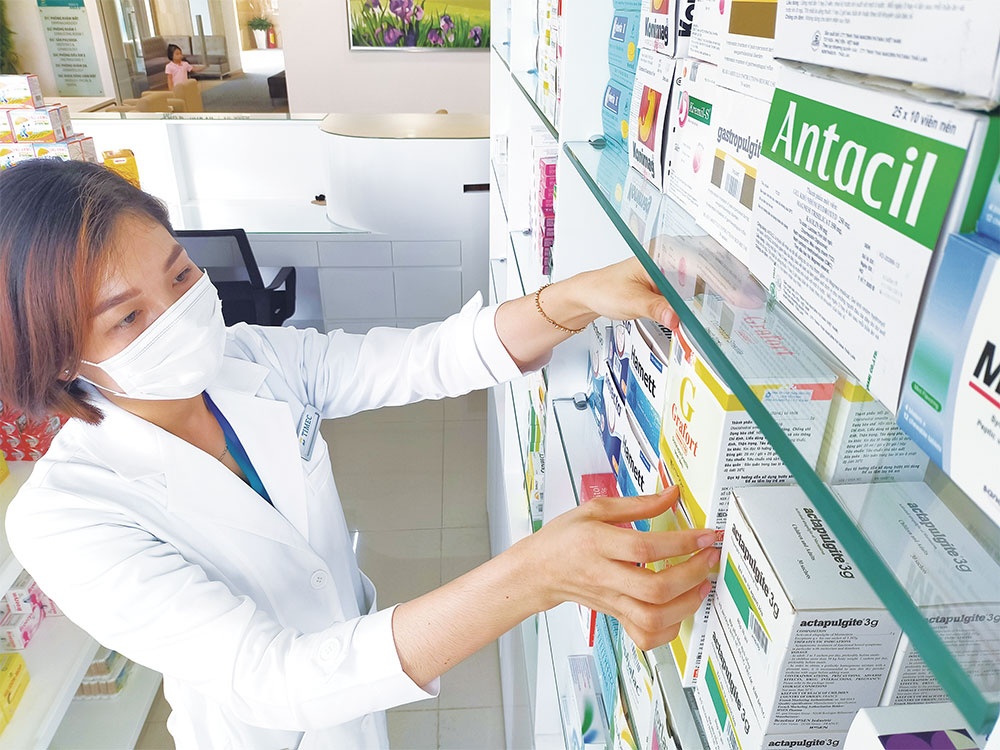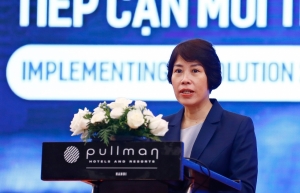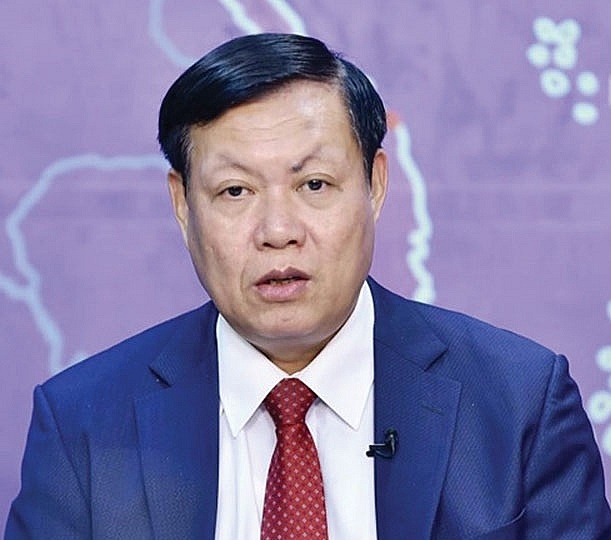Innovative medicine sales top the list for multinationals
 |
| Non-communicable diseases are still on the rise in Vietnam, and thus more choice and more modern answers are required, Photo: Le Toan |
Pfizer plans to bring numerous innovative medicines to Vietnam over the next four years. This is in line with its global strategy, as the company has made significant progress towards launching 19 new products over an 18-month span, having executed 11 launches so far.
According to Pfizer, the company continues to build momentum, recently attaining key milestones for several products, including the US launches of Prevnar 20 in paediatric patients; as well as US approvals and launches of several other key medicines
Darrell Oh, country manager of Pfizer Vietnam, told VIR, “Pfizer Vietnam will continue focusing our business where we believe we can have the greatest impact on patients and society – pursuing what we believe to be the most innovative biopharmaceutical therapies and vaccines.”
“More than ever, we believe that the innovative industry can play an important role in rebuilding and improving Vietnam’s health system to better address tomorrow’s challenges with sustainable development,” Oh said. “Pfizer has been and will continue to support and accompany Vietnam in building a biopharmaceutical sector with the purpose of delivering breakthroughs that change patients’ lives.”
Other multinationals are making similar moves. GSK Vietnam and EPLUS Research JSC in July signed an MoU to help local people access the world’s innovative healthcare solutions.
Luis Arosemena, senior vice president for emerging markets at GSK, said, “Vietnam is one of GSK’s six top-priority markets out of a total of more than 100 emerging countries. We will continue to unite science, technology, and talent to bring innovative healthcare solutions to anyone who needs them.”
A representative of Sanofi Vietnam, added, “The company prioritises supply continuity for patient access and consumers, to be proactive engagement through dialogue with authorities to support the growth of the local pharma industry and improve patient access to innovative medicines, vaccines and healthcare products, and to make proactive contributions to amendments, as well as changes of different laws and policies in the coming years.”
Therapies from multinationals in Vietnam have the greatest influence on patients and society, which is facing a huge disease burden. Non-communicable diseases (NCDs) are also on the rise.
According to Vietnam’s Ministry of Health (MoH), recent hospital reports indicate that 65-75 per cent of inpatients suffer from NCDs. At hospitals, cancer treatment departments, and respiratory and cardiovascular departments are full of patients. Mental health is also a huge challenge.
Dr. Tran Quoc Bao from the Department of Preventive Medicine under the MoH said the burden of NCDs was huge, causing about 80 per cent of deaths in Vietnam.
Rare diseases are also a burden. Statistics from the MoH showed that in Vietnam, there are currently about 100 rare diseases, and six million people are suffering from them, meaning that one in 15 people have a rare disease, of which up to 58 per cent are found in children.
Multinationals now seek to offset declining sales, and their moves and strategies in Vietnam are aligned with this. In particular, Pfizer Inc. in August reported its latest financial results, recording second-quarter sales of $12.73 billion, down 54 per cent from the same period a year ago.
Pfizer blamed the contraction in revenues for the anticipated decline in Paxlovid and Comirnaty sales. Accordingly, the company’s COVID-19 vaccine raked in $1.49 billion in sales, down 83 per cent from the year-ago quarter. Pfizer’s antiviral pill Paxlovid posted $143 million in revenue, a drop of 98 per cent.
Pfizer and rival drugmakers like Moderna have seen a steep decline in such sales this year. Pfizer, Moderna, and Novavax are preparing for the US to shift such products to the commercial market, which means those companies will start selling vaccines and treatments directly to healthcare providers this fall.
AstraZeneca released its second quarter earnings in July, announcing that total revenue rose to $11.42 billion from $10.77 billion in the second quarter of 2022. The revenue growth represented a step in the right direction for AstraZeneca, which has sought to offset declining sales. AstraZeneca is banking on eight cancer trials this year, including TROPION-Lung01.
In its own second quarter earnings report also released in July, Sanofi disclosed net profit of $1.58 billion, a jump over the $1.29 billion from the same period last year. Sales dropped, however, from $11.15 billion in the second quarter of 2022 to $10.9 billion in 2023.
More positive changes are expected by some in order to propel pharma prospects forward.
“We look forward to the amendment of pharmacy law and creating faster access and availability of new medicines, improving the business environment, and avoiding the introduction of policy measures that may create more barriers to patient access,” said the representative of Sanofi Vietnam.
“By doing so, patients in Vietnam will benefit from timely access to innovative medicines, and Vietnam can build a strong foundation for the development of an innovative pharmaceutical industry.
| Do Xuan Tuyen - Deputy Minister of Health
Since the beginning of 2023, the healthcare sector has achieved important results. Specifically, the building of policies has been promoted, and complexities in bidding for procurement of drugs, equipment, and medical supplies are gradually being removed. Remuneration policies for medical forces, especially front-line officials in epidemic prevention, are paid attention to and the healthcare workforce is being restructured and improved. The sector has promoted institutional work, promoted disbursement of public investment, and accelerated the progress of projects for epidemic prevention as well as medical examination and treatment. This is especially so in terms of dealing with the shortage of drugs and equipment, while taking measures to ensure the supply of vaccines for the national vaccination programme. In the first six months of 2023, the number of outpatient and inpatient medical examinations increased at hospitals. Some hospitals even saw an increase of more than half compared to the same period of 2022. The patient satisfaction rate reached over 90 per cent. The ministry regularly reviews and promulgates guidelines for diagnosis and treatment, as well as technical procedures under authority to create better conditions for exam and treatment facilities to apply new methods in treatment and payment of such service costs with social insurance agencies. It also continues to synchronously implement solutions to reduce hospital overload and improve service quality at all levels by expanding the network of satellite hospitals in provinces and cities, while strengthening the application of sci-tech in medical examination and treatment, and tech transfer. The ministry is strengthening supervision and promotion of quality improvement, and implementation of online and remote exam and treatment, connecting higher-level hospitals with related facilities nationwide, including remote areas and islands. Regarding medical finance, the ministry reviews and arranges the list of technical services and develops economic and technical norms as a basis for implementing medical service prices in line with the roadmap to correctly and fully calculate management cost and depreciation of fixed assets, ensuring that prices can be adjusted while still achieving the goal of curbing inflation, stabilising the macroeconomy, and promoting the roadmap of universal health insurance. At the same time, it reviews, develops, and promulgates circulars to create a legal corridor for the procurement and bidding of drugs and medical equipment. The sector must continue to make efforts to fulfill the tasks assigned. They include accelerating digital transformation, reforming admin procedures, and focusing on removing difficulties in granting licences for drugs, equipment, health protection foods, and more to facilitate business and protect people. |
 | MPI calls on investors to make suggestions in pharma sector The Ministry of Planning and Investment has called on investors and manufacturers to contribute opinions and proposals to attract more investment capital and receive technology transfer to promote the development of the pharmaceutical sector of Vietnam. |
 | Stem cell technology in regenerative medicine - a true global trend Experts in Vietnam, including some from the US, on July 30 discussed the importance of stem cell technology (SCT) in regenerative medicine. |
 | Legal aid priorities for healthcare M&A in Vietnam With its economic sector being seen as the most promising and fastest-growing in Southeast Asia, coupled with the increasing demand for medicine and pharmaceuticals, Vietnam has reaped many rewards in the growth and development of the healthcare industry along with many improvements over the past few years. |
What the stars mean:
★ Poor ★ ★ Promising ★★★ Good ★★★★ Very good ★★★★★ Exceptional
Themes: Healthcare Platform
- PM outlines new tasks for healthcare sector
- Opella and Long Chau join forces to enhance digestive and bone health
- Hanoi intensifies airport monitoring amid Nipah disease risks
- Cosmetics rules set for overhaul under draft decree
- Policy obstacles being addressed in drug licensing and renewal
Related Contents
Latest News
More News
- PM outlines new tasks for healthcare sector (February 25, 2026 | 16:00)
- Myriad risks ahead, but ones Vietnam can confront (February 20, 2026 | 15:02)
- Vietnam making the leap into AI and semiconductors (February 20, 2026 | 09:37)
- Funding must be activated for semiconductor success (February 20, 2026 | 09:20)
- Resilience as new benchmark for smarter infrastructure (February 19, 2026 | 20:35)
- A golden time to shine within ASEAN (February 19, 2026 | 20:22)
- Vietnam’s pivotal year for advancing sustainability (February 19, 2026 | 08:44)
- Strengthening the core role of industry and trade (February 19, 2026 | 08:35)
- Future orientations for healthcare improvements (February 19, 2026 | 08:29)
- Infrastructure orientations suitable for a new chapter (February 19, 2026 | 08:15)


 Tag:
Tag:



















 Mobile Version
Mobile Version